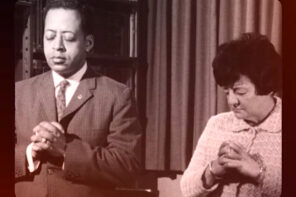This week a news item has been making the rounds concerning a video of New Age channeler JZ Knight making offensive remarks about Jews, Catholics, Mexicans, and gays. An article by Susy Buchanan of the Southern Poverty Law Center described how Knight’s movement, the Ramtha School of Enlightenment (RSE), is suing former members who uploaded the videos of Knight’s racist statements to the Internet in 2012.
In the state of Washington, the leaked videos also embarrassed democratic candidates who have accepted $70,000 in campaign donations from Knight (much to the delight of The Freedom Foundation, a libertarian think tank). Knight claims the statements were satirical and taken out of context, though it’s difficult to imagine a context in which statements such as, “Fuck God’s chosen people! I think they have earned enough cash to have paid their way out of the goddamned gas chambers by now,” would not be tasteless and offensive.
However, none of the reporting on this story has thought to ask why Knight was making these statements or why her minority followers—including Latinos, Jews, and gays—have rallied to her defense. Instead of taking on the difficult task of interpreting the religious other, media coverage has folded the situation into a familiar and comfortable narrative of a demented cult leader.
“Ramtha-gate” is a classic study in how popular ideas about cults operate in public discourse. Beginning in the 1960s, an idea of a generic religious cult began to form in the American imagination: in contrast to “good” religion, the “cult” is led by a mentally disturbed charismatic leader; to the extent the leader is capable of rational thought, he or she is a greedy con artist; meanwhile, cult followers are stupid and credulous, have no agency due to brainwashing, and are at risk for committing mass suicide.
Even if readers know virtually nothing about a particular movement, a few choice words is all it takes to invoke the master narrative of the cult and all of the tacit claims the label implies.
The first paragraph of Buchanan’s piece contains a reference to “Kool-Aid.” Since the Jonestown massacre in 1978, “drinking the Kool-Aid” has become shorthand for claiming that a particular group has no agency and that its views are therefore unworthy of consideration or debate. The area where RSE holds its retreats is described as a “compound,” which has become a popular term for any facility that “cults” own since the Branch Davidian siege in 1993. Terms like “cult compound” invoke a military register, presenting the group as a foreign and potentially dangerous force rather than fellow community members.
As with other cult controversies, coverage of Ramtha-gate quotes apostates but not active members. It also cherry-picks the bizarre-sounding beliefs and practices of a group and presents them independently of a larger worldview that might render them sensible. Lastly, it focuses heavily on efforts to raise money, applying scrutiny that more established religious organizations are often exempt from. Curiously, Buchanan’s piece concludes by quoting a former RSE-member:
In America, there are many First Amendment rights I agree with, even if I disagree with what is being said. Where I get concerned is when you have a large group of people that believe they are hearing from a powerful enlightened entity, creating an “us versus them” situation.
This warning about an “us versus them situation” is an ironic ending to an article that presents RSE as a greedy and potentially dangerous organization run by a hate-mongering madwoman.
This is not meant to defend Knight or to apologize for her offensive remarks. They are disturbing and Buchanan is right to call attention to the situation. I would, for example, very much like to know why Knight apparently made a joke about the Holocaust. Unfortunately, almost nothing that has been said so far has provided any context that might render these remarks understandable.
Instead of asking hard questions about RSE, we have smugly dismissed Knight as another manifestation of the cookie-cutter cult leader. This narrative appeals to readers because it allows us to congratulate ourselves on being smarter than the avaricious, mad, and racist cult leader and his/her duped followers.
But while this may feel good, it is intellectually lazy. To actively promote social justice in a religiously plural society, it is not enough to simply sort other people’s worldviews into the categories of good and evil religions. We have to ask why. The prospect of taking this question seriously makes some people deeply uncomfortable. If we attempt to analyze cult leaders as fellow human beings, we risk destroying the facile categories we have imposed onto the religious landscape.




